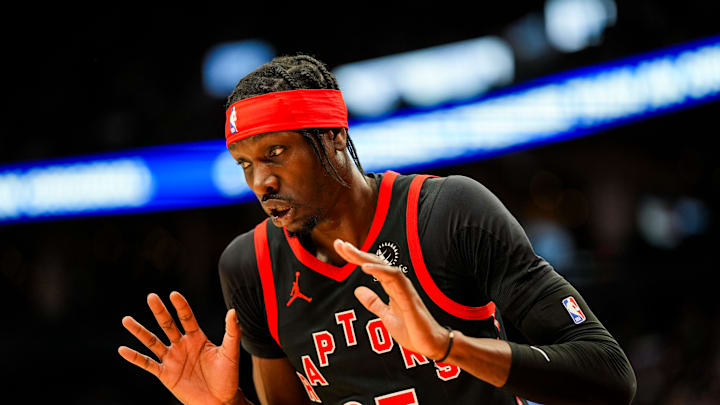Chris Boucher put a cap on his seven-year tenure with the Toronto Raptors on Tuesday when he inked a veteran minimum deal to join the Boston Celtics. Of course, Boucher is coming to town at a strange time. The Cs just lost a large contingent of their 2024 NBA Championship core, leaving them primed for a weird, in-between type of season as Jayson Tatum recovers from his ruptured Achilles tendon.
They might be bad. They might still be good. Only time will tell. It’s an atypical situation for a veteran like Boucher to join as a free agent.
From Boston’s perspective, the signing sends a message that they’ll be looking to compete despite all of the changes this summer. Otherwise, they’d probably elect for a younger candidate over the 32-year-old big man.
Meanwhile, the Celtics serve as an intriguing destination for Boucher because of the opportunity that they present. After seeing Kristaps Porzingis, Luke Kornet, and presumably Al Horford leave town, their frontcourt was always looking to be thin. Then, after trading away Georges Niang, the path for minutes was wide open.
Should Chris Boucher start for the Celtics?
Boucher will likely be battling Sam Hauser for the final spot in the Celtics’ starting lineup, alongside Payton Pritchard, Derrick White, Jaylen Brown, and Neemias Queta.
Regardless of whether or not he starts, the minutes are going to be there. It’s simply a matter of where he can help the team the most.
Tatum’s absence leaves the team a bit small. Though the star forward makes headlines with hs high scoring output, he’s grown to be just as impactful on the glass. Last season, he averaged 8.7 rebounds per game in the regular season and dialed it up a notch in the playoffs, ripping down 11.5 per contest.
His production there will be missed, and Boston will need to find a way to make up for it if they want to compete in the way they say they do. Sure, team rebounding is an option. But, the inclusion of Boucher in the starting lineup would lighten that burden for the rest of the rotation regulars.
The six-foot-nine-inch forward averaged 4.5 rebounds in just 17.2 minutes per game in Toronto last season. His size, combined with his low-usage offensive play style, centered around cutting and catch-and-shoot triples, would make him a welcome fit next to Brown and White. Boucher could be a serviceable floor spacer in the Celtics' offense. He knocked down 36.3% of his attempts from beyond the arc last year, the second-highest percentage of his career.
It’s no coincidence that Boucher’s two best shooting seasons were also the ones in which he shot the highest volume. If he’s encouraged to fire away with the Cs, it may make him even more effective.
Regardless of how effective he is, he won’t quite be at the level of Hauser, who is one of the league’s best snipers. The Wisconsin native has never had a season, college or pro, where he’s shot below 40% from three. Not to mention that his release is lightning quick, making it difficult for defenders to collapse on drives.
Meanwhile, Boucher’s shot is slow enough that defenders could shuffle over to disrupt Brown on a drive and still have the time to get out to contest the big man.
Keeping the opposition honest will be all the more important this season, especially considering that Neemias Queta won’t help spread the floor much with his limited offensive repertoire. Boucher should be able to fit next to him for stretches, considering he did the same next to Jakob Poeltl in Toronto, but the pairing likely won’t be part of Boston’s strongest lineups.
The spacing Hauser provides will better ease the transition for Brown, White, and Pritchard, who will all have an increased responsibility on offense. Rolling with the sniper in the starting lineup is the best way to limit growing pains for the trio.
Regardless, Boucher’s skillset is unlike any other of the Celtics’ current big men. They’ll be able to utilize him at both the four and the five, making for some versatile lineup choices.
